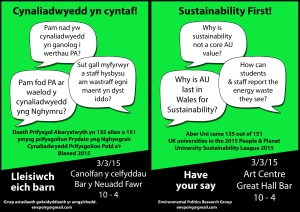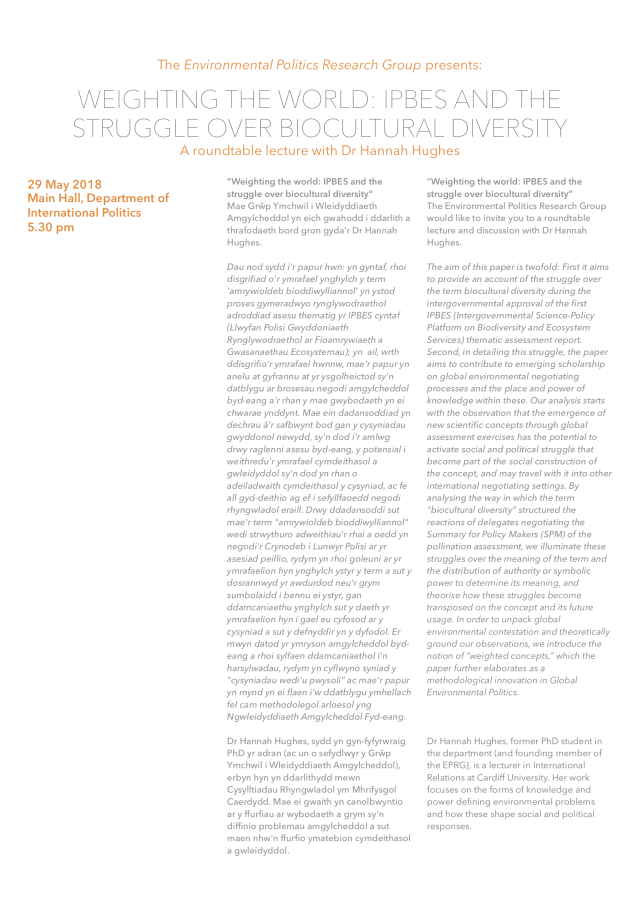
Weighting the world: IPBES and the struggle over biocultural diversity
‘The other nonhumans – Environmental issues within the academy’
| Hoffai’r Grŵp Ymchwil Gwleidyddiaeth Amgylcheddol eich gwahodd i seminar gyda Dr Angela Last.
Mae yna erchyllbeth sy’n dychwelyd o hyd ac o hyd: sef papurau astudiaethau amgylcheddol lle mae’r awduron yn ceisio di-ganoli’r dynol a hwythau’n siarad o safle breintiedig. O ymdriniaethau o ddaeareg sy’n anwybyddu safleoedd o drawma hiliol neu rywiol i drafodaethau ar ddifodiant sy’n hepgor safleoedd lle mae trais gwladychol yn parhau, mae ymdrechion o’r fath i ddyrchafu’r byd nad yw’n ddynol yn aml yn cadarnhau safle dynol breintiedig (e.e. gwyn, dosbarth canol, gwryw, abl o gorff, heterorywiol, cisgender). Er bod awduron sy’n sensitif i anghydraddoldeb dynol wedi honni y gall hunaniaethau nad ydynt yn ddynol gynnig ffordd o wrthsefyll cyflyrau normadol neu ddominyddol y dynol, nid dyma a wneir yn y rhan fwyaf o bapurau. Mae’r sefyllfa gyffredin hon yn amlygu dwy broblem sylfaenol: 1) academi anghyfartal a dulliau cysylltiedig o gynhyrchu gwybodaeth a 2) damcaniaethau am yr amgylchedd, yn enwedig trwy lens materoliaeth, lle mae cwestiynau hollbwysig yn ddistaw/cael eu distewi oherwydd diffyg atblygiadol o ran safbwyntiau’r awdur ei hun. Nod y papur hwn yw codi cwestiynau a syniadau llai amlwg o fewn materoliaeth newydd a allai helpu i fynd i’r afael â’r mater hwn. Mae Angela yn ddaearyddwr (a cherddor) ac mae ganddi gefndir ym maes celf a dylunio. Mae ei gweithiau eang yn edrych ar y berthynas rhwng daeareg, geowleidyddiaeth a geofarddoneg yn ogystal â ‘materoliaeth gosmig’ y cyfnod rhwng y rhyfeloedd, dadleuon amgylcheddol, y cysylltiadau rhwng celfyddyd a gwyddoniaeth, a mwy. Mae ei blog ‘Mutable Matter’ wedi bod yn rhedeg ers ychydig dros ddeng mlynedd. Mae hi hefyd yn aelod o Weithgor Hil, Diwylliant a Chydraddoldeb y Gymdeithas Ddaearyddol Frenhinol/Sefydliad Daearyddwyr Prydain. Dydd Mercher 29 Tachwedd, 5.30-7yh, Prif Neuadd yr Adran Gwleidyddiaeth Ryngwladol. Croeso i bawb! |
The Environmental Politics Research Group would like to invite you to a seminar with Dr Angela Last.
There is a horror that keeps returning: that of environmental studies papers whose authors try to decentre the human while speaking from a privileged position. From affective engagements with geology that ignore sites of racial or sexual trauma to talks on extinction that disappear on-going sites of colonial violence, such attempts at privileging the nonhuman often end up affirming a privileged human position (e.g. white, middle class, male, able-bodied, heterosexual, cis). While authors sensitive to human inequality have asserted that nonhuman identities can become a means of countering normative or dominant states of the human, this is not what is performed in the majority of papers. This recurring situation points to two fundamental underlying problems: 1) an unequal academy and related knowledge production and 2) theorisations of the environment, especially through the lens of materialism(s) in which crucial questions remain silent/silenced due to lack of reflexivity on the authors’ own positions. In exploring this intersection, this paper aims to draw out less prominent questions and provocations within new materialism that may help address this issue. A geographer (and musician) with a background in art and design, Angela’s wide-ranging works investigate the relations between geology, geopolitics and geopoetics as well as the ‘cosmic materialism’ of the interwar period, environmental controversies, art-science relations, and more. Her blog ‘Mutable Matter’ has been running for just over ten years. She is also a member of the Race, Culture & Equality Working Group of the Royal Geographical Society/Institute of British Geographers. Wednesday 29th November, 5.30-7pm, Main Hall, Department of International Politics. All welcome! |
Talking food sovereignty with Robin Dunford
On May 27, 2017, EPRG hosted Dr. Robin Dunford from the University of Brighton who spoke about food sovereignty and transnational peasant resistance. Robin’s talk drew researchers, producers, and people interested in food politics and opened an important conversation about different ways in which we can start working towards an alternative vision of the food system.
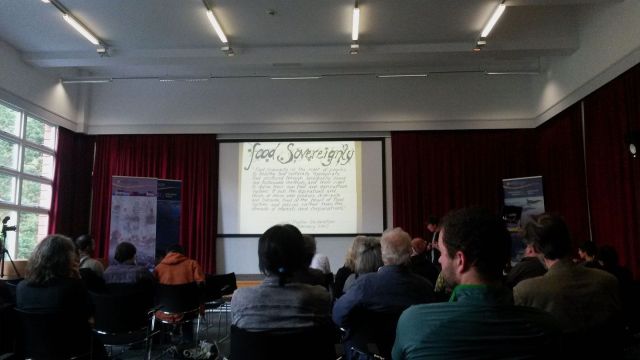
Drawing on his 2016 book and multiple journal articles, Robin’s talk focused on the transnational networks such as La Via Campesina, and their efforts to recognize peasant rights at the UN level through the Declaration on the rights of peasants and other people working in rural areas. Drawing out the major victories of the movement, but also the political concessions lost in the efforts to pass the Declaration, the discussion highlighted the tensions innate to balancing grassroots activism and transitional political initiatives.
Follow this link for the full video.
Here is Robin’s description of his talk:
In the face of a globalised food system that destroys the planet and dispossesses people living from the land and sea, transnational peasant activists have demanded food sovereignty. Food sovereignty is a right to democratic control of the food system, and a right for peasants to produce ‘our own food on our own territory’. It points toward a world in which small producers cool the planet whilst feeding the world through small-scale, environmentally friendly forms of food production. This talk will explore the practices through which food sovereignty has been demanded and enacted. It will also reflect on the idea of ‘food sovereignty’, arguing that it is a pluriversal value, demanding a world in which many different ‘worlds’ of living from the land are possible. Finally, it will explore attempts, by transnational peasant activists, to incorporate food sovereignty into a United Nations Declaration on the Rights of Peasants and Other People in Rural Areas, exploring the process of translation that has occurred as rights demanded by rural social movement activists have gone through Human Rights Council processes.
Dr Robin Dunford researches and lectures in globalisation and contemporary war, with special interests in the practices and theories of transnational resistance.
Robin’s particular research focus is on how practices of resistance re-orientate understandings of human rights, citizenship, democracy and emancipation. He has written on practices of autonomous peasant resistance, focusing both on grass roots practices of land occupations and on transnational demands for rights to food sovereignty.
Environmental knowledge between academia and journalism: A seminar with Dr Mat Hope (23rd May)
| Rhannu gwybodaeth amgylcheddol rhwng academia a newyddiaduraeth: Seminar gan Dr Mat Hope
Dymuna’r Grŵp Ymchwil Gwleidyddiaeth Amgylcheddol a’r Ganolfan ar gyfer Gwleidyddiaeth Ryngwladol Gwybodaeth eich gwahodd i seminar gyda Dr Mat Hope. Er gwell neu er gwaeth, ni fu gwybodaeth amgylcheddol erioed yn fater gwleidyddol mor ganolog ac heriol. Yn wir, mae misoedd cyntaf gweinyddiaeth Trump wedi codi cwestiynau am ddilysrwydd gwybodaeth amgylcheddol a hinsoddol o bob math. Mae hon yn datblygu’n broblem sy’n diffinio’n hoes ymhlith academyddion sy’n gweithio yn y meysydd hyn a newyddiadurwyr sy’n awyddus i sicrhau bod gwybodaeth o’r fath ar gael yn ehangach. Ers gorffen ei Ddoethuriaeth mewn strategaethau cyfathrebu gwleidyddol yn nadleuon Cyngresol yr UD ar newid yn yr hinsawdd ym Mhrifysgol Bryste yn 2012, mae Dr Hope wedi gweithio fel dadansoddwr a gweithiwr i Carbon Brief, fel Golygydd Cysylltiol i’r cyfnodolyn Nature Climate Change ac, ers mis Hydref 2016, fel Dirprwy Olygydd DeSmog UK, sefydliad sy’n ymrwymedig i “ddadorchuddio dylanwad gormodol ymwrthod â gwyddoniaeth yr hinsawdd a’r diwydiant tanwydd ffosil ar bolisi’n ymwneud ag ynni a’r hinsawdd”. Yn y seminar, bydd Dr Hope yn cyflwyno ei brofiad ei hun o symud rhwng gyrfaoedd academaidd ac an-academaidd, y sialensiau sydd ynghlwm â ffurfiau academaidd a newyddiadurol o gynhyrchu gwybodaeth, ei brosiectau ymchwil presennol yn DeSmog UK ac, wrth gwrs, y cyd-destun gwleidyddol cyfredol yma ac yn rhyngwladol. Bydd y digwyddiad hwn, felly, yn berthnasol i unrhyw un sydd â diddordeb mewn: · Gwleidyddiaeth amgylcheddol gyfoes. · Y berthynas rhwng cynhyrchu gwybodaeth academaidd a newyddiadurol. · Llwybrau gyrfaol rhwng academia a newyddiaduraeth. · Cipolwg ‘y tu ôl i’r llen’ ar weithio ar gyfnodolyn megis Nature Climate Change. · Dyfodol gwareiddiad diwydiannol. Amser a Lleoliad: Dydd Mawrth, 23 Mai, 5.30-7pm, Y Brif Neuadd, Adran Gwleidyddiaeth Ryngwladol. Bywgraffiad Pellach: Mae Mat Hope yn Ddirprwy Olygydd DeSmog UK. Dechreuodd Mat weithio yn DeSmog UK ym mis Hydref 2016, yn fuan ar ôl i’r DU bleidleisio i adael yr UE, ac mae wedi bod yn gweithio ar ehangu’r sylw i rwydweithiau sy’n cael eu grymuso o’r newydd. Mae’n ysgrifennu, golygu ac yn comisiynu erthyglau ar bob mater y mae DeSmog UK yn rhoi sylw iddynt. Bu Mat yn gweithio’n flaenorol fel Golygydd Cysylltiol ar gyfer Nature Climate Change, ac ef oedd yn gyfrifol am roi sylw i’r gwyddorau cymdeithasol gan ysgrifennu am sut y mae dadansoddiad gwleidyddol, cymdeithasol ac economaidd yn allweddol i ddeall yr heriau sy’n gysylltiedig â newid yn yr hinsawdd. Rhwng 2012 a 2014, roedd Mat yn ddadansoddwr ac yn ysgrifennydd i Carbon Brief, gan roi sylw i bob agwedd ar ddadleuon yn ymwneud ag ynni a newid yn yr hinsawdd yn y DU, o wirio-ffeithiau safbwyntiau denier i adrodd am swyddogaeth y llywodraeth mewn trafodaethau rhyngwladol. Ganwyd Mat yng Nghaer-grawnt, y DU, ac astudiodd ym Mhrifysgol Bryste. Yn 2012, cwblhaodd ei PhD mewn strategaethau cyfathrebu gwleidyddol yn nadleuon Cyngresol yr UD ar newid yn yr hinsawdd, ac enillodd Wobr Hilary Hartley am y traethawd gorau yn nosbarth graddio ei adran. Mae Mat yn aelod o Undeb Cenedlaethol y Newyddiadurwyr. Twitter: @matjhope |
Environmental knowledge between academia and journalism: A seminar with Dr Mat Hope
The Environmental Politics Research Group and the Centre for the International Politics of Knowledge would like to invite you to a seminar with Dr Mat Hope. For better or worse, environmental knowledge has never been more a more pivotal or contested political issue. Indeed, the early months of the Trump administration have challenged the very legitimacy of environmental and climatological knowledge of every kind. This is coming to be an era-defining problem for both academics working in these fields and journalists seeking to make such knowledge more widely available. Since completing his PhD on political communication strategies in US Congressional climate change debates at the University of Bristol in 2012, Dr Hope has worked as an analyst and writer for Carbon Brief, as an Associate Editor for the journal Nature Climate Change and, since October 2016, as Deputy Editor of DeSmog UK, an organisation dedicated to “uncovering the undue influence of climate science denial and the fossil fuel industry on energy and climate policy.” In this seminar, Dr Hope will talk through his experience of moving between academic and non- or para-academic careers, the challenges of academic and journalistic forms of knowledge production, his current research projects at DeSmog UK and, of course, the contemporary political context both domestically and internationally. This event will therefore be relevant to anyone interested in: ▪ Contemporary environmental politics. ▪ The relationship between academic and journalistic knowledge production. ▪ Career paths between academia and journalism. ▪ The ‘behind the scenes’ workings of a journal such as Nature Climate Change. ▪ The future of industrialised civilisation. Time and Place: Tuesday 23rd May, 5.30-7pm, Main Hall, Department of International Politics. Extended Biography: Mat Hope is Deputy Editor of DeSmog UK. Mat began working with DeSmog UK in October 2016, shortly after the UK voted to leave the EU, and has been working on expanding our coverage of newly empowered networks. He writes, edits and commissions articles on all issues covered by DeSmog UK. Mat previously worked as an Associate Editor for Nature Climate Change, handling its social science coverage and writing on how political, social and economic analysis is key to understanding the challenges associated with climate change. From 2012 to 2014, Mat was an analyst and writer for Carbon Brief, covering all facets of the UK’s energy and climate change debate, from fact-checking denier positions to reporting on the government’s role in international negotiations. Born in Cambridge, UK, Mat studied at the University of Bristol. In 2012, he completed his PhD on political communication strategies in US Congressional climate change debates, which won the Hilary Hartley prize as the best thesis in his department’s graduating class. Mat is a member of the National Union of Journalists. Twitter: @matjhope |

The Politics of Conservation & Growing Food: Fieldtrip to Blaeneinion Farm, Powys.
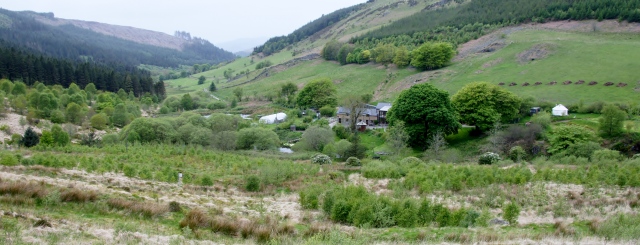
The last EPRG event of the year was an inspiring visit to Blaeneinion farm – home to a reforestation project, organic farm, and one male European beaver. After a transnational effort at organizing with the three group conveners in Wales, Mexico, and Serbia, we successfully car pooled to the Artist’s Valley that is the home of the 75ha of the farm. We were welcomed by Sharon, the founder and director of the project, and after some tea and biscuits in the beautiful on-site lodge, we got a detailed tour of the many things that are happening at Blaeneinion. Sharon’s enthusiasm, dedication, and ability to manage such a versatile project kept us going despite the rain clouds that gathered over Artist’s valley in the afternoon!
The project started as a reforestation project – bought as an old sheep farm, the site now has more than 70,000 trees planted. With the help of a grant from the Forestry Commission in Wales and hardworking volunteers who take ‘planting holidays,’ the barren pastures are slowly being turned into a young forest.
Because of the harsh climate which includes 100 mph winds and frosts well into April, the project was marked by many losses in the early years, but also a sharp learning curve. Choosing trees fit specifically for high winds and long winters, and developing her own know-how on saplings, spirals, and planting techniques, Sharon is creating a deciduous forest that will not only help recover the lost soil quality but also provide food from walnut and chestnut, elder, wild pear, wild cherry and plum trees. In the years to come, it will also provide timber for fuel, building materials, furniture making, sap for wine production and much more. One of the most educating experiences of the tour was comparing plots in different stages or re-wilding: seeing a plot that has been free from grazing for just a couple of years, next to a plot that has had more than five years to start its recovery, shows the true extent and importance of soil recovery in mid Wales.
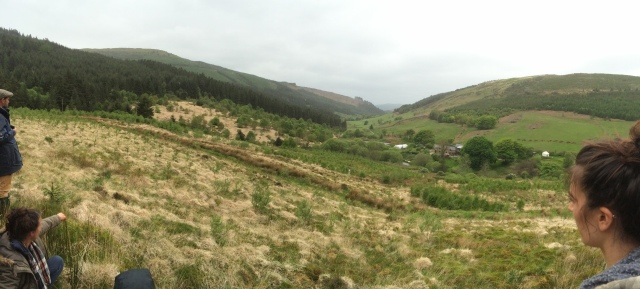
One part of the farm is slowly being turned into a forest garden, following the principles of agroforestry – plants are planted in ‘stories’ or layers to create an edible and medicinal ecosystem. This system mimics natural systems, is highly productive, and bypasses many of the problems that monoculture systems face.
Producing food with many challenges like poor acidic soil and endless armies of slugs was a challenge for Sharon, but she used her experience from two decades of permaculture projects in London and started a producing and selling food at Blaeneinion. 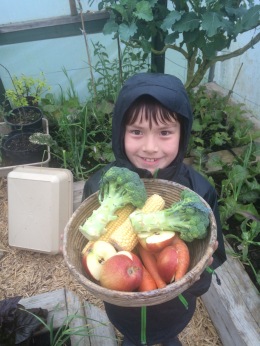 We took cover from the rain in two poly-tunnels built by Sharon and volunteers at Blaeneinion – the humid air and comfortable temperatures extends the growing season for a crucial few months and allows a steadier income. Sharon’s beautiful produce is now a part of the Green Isle Growers’ veg box scheme and also sold at the Community Shop in Machynlleth.
We took cover from the rain in two poly-tunnels built by Sharon and volunteers at Blaeneinion – the humid air and comfortable temperatures extends the growing season for a crucial few months and allows a steadier income. Sharon’s beautiful produce is now a part of the Green Isle Growers’ veg box scheme and also sold at the Community Shop in Machynlleth.
The biggest reward at the end of the tour was seeing Blaeneinion’s Mr. Beaver come out for the night and have his breakfast of apples, carrots, and willow. Mr Beaver lives in a 2.5-acre enclosure at Blaeneinion and attracts crucial guests needed to keep the project going.
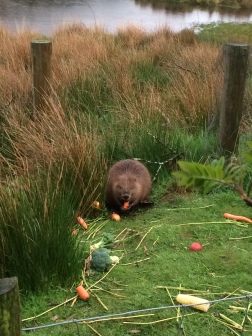
If you would like to get closer to Blaeneinion, there are two ways to spend more time on the farm. If you want to actively contribute to the re-planting project, you can take a working holiday and help out Sharon by planting trees and doing basic farm work. Food and accommodation in a yurt provided!
If you would like to use Blaeneinion as a quiet escape, you can also stay in one of the lodges at very affordable prices. More than just comfortable accommodation, these lodges provide the crucial funding needed to keep the project going. You can check out the website and find out more info by e-mailing Sharon directly at: 01654 781215, info@blaeneinion.co.uk.
This was the last EPRG event for the 2015/2016. We will spend the next month developing the programme for next year. If you want to get more involved or have ideas that we could work on together, please do get in touch with coordinators Katarina Kušić (kak12), Danielle House (dah20) and Justa Hopma (jmh23). We are looking forward to seeing you all again in the autumn!
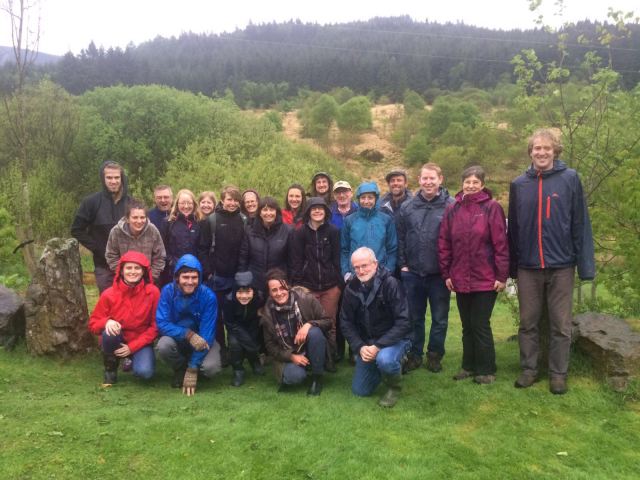
“Many thanks to the EPRG and of course to amazing Sharon. I found Blaeneinion to be impressive and inspiring; the evening was most enjoyable, despite the rain. Looking forward to seeing Mrs Beaver next time!”
– Professor Henry Lamb, DGES, Aberystwyth University
“Thanks to the EPRG for organising the outing to Blaeneinion Farm near Machynlleth yesterday. It’s an ambitious permaculture project set on 75 acres and includes reforesting the open pasture with native broad leaf, nut bearing and fruiting trees and the reintroduction of beavers. I found it really inspiring. Taking back the Earth!”
– Mike Fincken, Greenpeace captain of the Rainbow Warrior
Desperately seeking structural change!
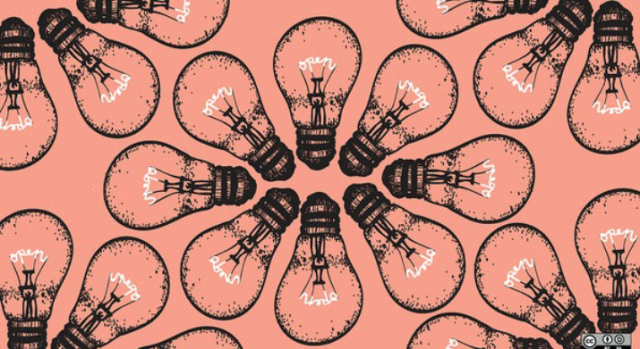
The EPRG have had two great events in the past two weeks, with a screening of ‘This Changes Everything’ based on the book by Naomi Klein, and a talk from Dr Clive Gabay, ‘Desperately seeking Gramsci: A personal journey through development policy 2008-2015’.
Fortunately Clive arrived in Aber unaware and unaffected by this week’s flooding, for a relatively dry and calm mid-Wales night. In his talk he explained his engagement throughout his career with the UN’s Millennium Development Goals (MDGs), which this September developed into the next 15 year phase as the Sustainable Development Goals (SDGs). Clive was originally drawn to engage with the MDGs during his PhD where he examined hegemony and counter-hegemony in relation to the Global Call to Action against Poverty (G-CAP) initiatives in India and Malawi.
Within this context, Clive explored different conceptualisations of resistance. Following James Scott, Clive explored how certain acts, such as throwing defecated waste out windows of newly built apartment blocks in Mumbai, may not be understood as political, but can be seen as ‘resistant blockages of development projects’ (see also Gabay 2013). Throughout this engagement Clive has observed the ways in which the MDGs have acted as a disciplinary power, in certain contexts and in certain ways; from the exclusion of groups such as the elderly, not explicitly addressed in any of the 8 MDGs and resulting in limited access funding, to the ability of the MDGs to legitimise states simply by engaging with them on a relatively superficial level.
So what are the prospects for the SDGs over the next 15 years? Clive has explored the potential they have to create a different sort of conversation. The fact that the SDGs sought greater civil society consultation and the idea that they are ‘global’ in nature (i.e. would refer to the whole world, instead of being a set of goals devised by the North and imposed on the South) shows the pssibility of radical openings. Clive used the example of the discussion on obesity, which was a part of the consultation process, but did not make it to the final goals. This discussion explicitly targets the North and would imply questioning the policies of large food producers and the structural conditions of the global food system. However the extent to which ‘northern’ or ‘western’ states would allow themselves to become the objects of UN development is questionable, recently witnessed in another context when in 2014 the UN special reporter on housing released a report calling for the suspension of the coalition government’s bedroom tax, which she assessed as contravening many international treaties. The backlash against the UN from the British government exposed what we should expect when they become the target of development policy and advice. Therefore the openings offered by the SDGs for now remain just sporadic new conversations, but carry within them the potential for future rethinking of development paradigms.
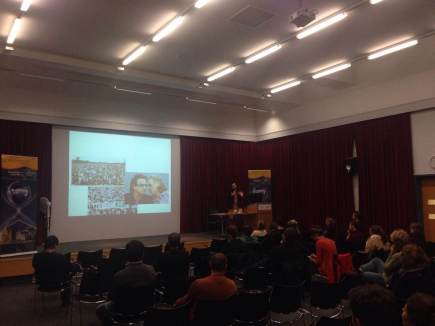 In the discussion following the talk some critical questions were asked regarding the radical potential of the SDGs. Is ‘development’ as conceived through the MDGs/SDGs possible? What is ‘development’ anyway? While the language of the SDGs is more inclusive and comprehensive than that of the MDGs, it is still comfortably situated within a neoliberal discourse. They talk of a concern for ‘access’ to energy, housing or food, but notably don’t refer to ‘the right to’ these things. Access can easily be interpreted as market access, so does this mean that ideas of the right to land or the right to affordable and green energy remain too political to make it into UN discussions?
In the discussion following the talk some critical questions were asked regarding the radical potential of the SDGs. Is ‘development’ as conceived through the MDGs/SDGs possible? What is ‘development’ anyway? While the language of the SDGs is more inclusive and comprehensive than that of the MDGs, it is still comfortably situated within a neoliberal discourse. They talk of a concern for ‘access’ to energy, housing or food, but notably don’t refer to ‘the right to’ these things. Access can easily be interpreted as market access, so does this mean that ideas of the right to land or the right to affordable and green energy remain too political to make it into UN discussions?
In many ways, Gabay’s talk and last week’s screening of This Changes Everything formed an interesting balance as both argued attention needs to be paid to the structural causes of both poverty, inequality and climate change. Naomi Klein makes a big step towards a new form of environmentalism by explicitly stating that our economic system is to blame for climate change, and working within the capitalist system will not provide any long term solutions. Instead of despairing when faced with such a great enemy, Klein sees the various local mobilisations around the globe, which have fought against tar sands in Canada, gold mines in Greece, and pipelines in the US, as an opportunity to rebuild our communities away from the global capitalist system. In this reading, the climate crisis becomes an opportunity for a radical rethinking of our way of life and its alternatives.
Whilst global initiatives like the ones advocated by the UN may contain potential radical openings, within them a focus on localised responses to global crises might show us ways to progress that are not necessarily conceived through or in relation to a global growth oriented development discourse. The crucial question then becomes, what is the relation between local practice and agendas constructed at global level? Are local practices aimed at, for example, poverty alleviation, supported and reinforced by global development agendas such as those contained within the SDGs, or do they undermine them? If the latter, then the democratisation of international institutions and their country branches should become an absolute priority.
Gabay, C. ‘The MDG legacy: social, cultural and spatial engineering’, International NGO Training and Research Center (INTRAC), Briefing Paper 36
Who’s Getting Ready for Zero? Plans for the Paris Summit
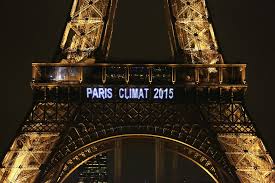 “If we can’t imagine a positive future, we can’t create it”, said Paul Allen, Co-ordinator of the Centre for Alternative Technology’s ‘Zero Carbon Britain’ project. This emphasised much of what Paul was arguing at the first EPRG event of 2015/16. Zero Carbon Britain (ZCB) is a research project to model what infrastructural and lifestyle changes are needed in Britain to bring carbon emissions down to a level that would avoid dangerous climate change – within a 1.5° to 2° ‘safe’ threshold. Recently, however, the team at the Centre for Alternative Technology (CAT), just a few miles from Aberystwyth, have focused on pooling carbon reduction models and projects from all round the world, on scales from cities to multi-national regions, to demonstrate the collective work being done on how to realistically meet the targets set.
“If we can’t imagine a positive future, we can’t create it”, said Paul Allen, Co-ordinator of the Centre for Alternative Technology’s ‘Zero Carbon Britain’ project. This emphasised much of what Paul was arguing at the first EPRG event of 2015/16. Zero Carbon Britain (ZCB) is a research project to model what infrastructural and lifestyle changes are needed in Britain to bring carbon emissions down to a level that would avoid dangerous climate change – within a 1.5° to 2° ‘safe’ threshold. Recently, however, the team at the Centre for Alternative Technology (CAT), just a few miles from Aberystwyth, have focused on pooling carbon reduction models and projects from all round the world, on scales from cities to multi-national regions, to demonstrate the collective work being done on how to realistically meet the targets set.
At the end of this month the COP21 will be held in Paris, the next round of
international talks seeking to make an agreement on carbon reduction and climate change. Paul will be taking this research to the Paris negotiations, in order to share the research and the vision for tackling the problem. After the generally failed negotiations in Copenhagen in 2009, this year in Paris countries have already published their proposals of what they are willing to do to reduce carbon emissions, and sadly they already fail to reach the target of bringing emissions back to a level that would limit projected climate change to below threshold levels. So what hope is there for the COP21?
This issue, and equally fundamental issues of economic development vs. environmentalism, political will and the corporate lobby, as well as individual behaviour change, were discussed by attendees after Paul’s talk. Some hope, it was argued, comes from the potential of behaviour change; cultural shifts in attitude have happened before, and previously silent voices on climate change are now speaking out from an ethical, environmental and economic perspective, such as Governor of the Bank of England Mark Carney, and the Pope. These opinion leaders, it is argued, could effect the required cultural change. Complex issues such as the increased availability of cheap flights and the continued popularity of meaty diets are potential stumbling points. Is direct governmental action through taxation and regulation a sine qua non? If so, they may prove a difficult political sell.
Discussion then turned to what we could do in Aberystwyth. Representatives from many departments in the room (InterPol, IBERS, Law & Crimin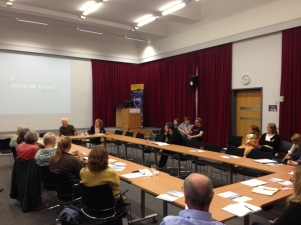 ology, Geography and the Business School, as well as Welsh Government and the public) were in agreement that some cross-departmental work is needed to address issues of carbon emissions
ology, Geography and the Business School, as well as Welsh Government and the public) were in agreement that some cross-departmental work is needed to address issues of carbon emissions
and sustainability within the University. A potential future avenue could be the Well-being of Future Generations Act that became law on 29 April 2015. The act could help pressure institutions into doing more. This is particularly relevant for universities in Wales, in light of the impending changes to funding criteria with an eye on long-term environmental sustainability. Now new connections have been made, we hope to work together on these issues in the coming year.
Rallying for real commitment to a low carbon future
Invitation: Shout for Sustainability! 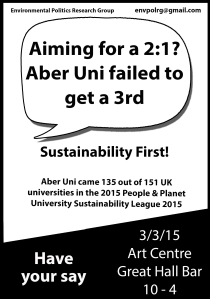 This space has been a bit quiet, but the Environmental Politics Research Group has been planning an event to raise public awareness of Aberystwyth University’s policies regarding environmental sustainability and reducing carbon emissions. After a film screening of “Disruption” earlier this year, we collectively decided that we wanted to do something that could realise more environmentally sustainable policies at our own institution, Aberystwyth University. After a few weeks of research into current policies and projects, a series of meetings and numerous practical preparations we are aiming to engage a broad public at our stall in front of the Great Hall Bar in the Aberystwyth Arts Centre on Tuesday 3 March from 10am to 4pm. We have prepared material to inform you more broadly about AU’s sustainability activities and we will also have a copy of our Open Letter to AU management at the stall, due to be posted that day. As a bit of a preview though, you can read a copy of the letter here. Should you be supportive of our concerns, we would welcome your signatures too! Do stop by at the stall at any time between 10 and 4pm to find out about current and future sustainability policies at Aberystwyth University. Hopefully see you on the 3rd ! the Environmental Politics Research Group (envpolrg@gmail.com)
This space has been a bit quiet, but the Environmental Politics Research Group has been planning an event to raise public awareness of Aberystwyth University’s policies regarding environmental sustainability and reducing carbon emissions. After a film screening of “Disruption” earlier this year, we collectively decided that we wanted to do something that could realise more environmentally sustainable policies at our own institution, Aberystwyth University. After a few weeks of research into current policies and projects, a series of meetings and numerous practical preparations we are aiming to engage a broad public at our stall in front of the Great Hall Bar in the Aberystwyth Arts Centre on Tuesday 3 March from 10am to 4pm. We have prepared material to inform you more broadly about AU’s sustainability activities and we will also have a copy of our Open Letter to AU management at the stall, due to be posted that day. As a bit of a preview though, you can read a copy of the letter here. Should you be supportive of our concerns, we would welcome your signatures too! Do stop by at the stall at any time between 10 and 4pm to find out about current and future sustainability policies at Aberystwyth University. Hopefully see you on the 3rd ! the Environmental Politics Research Group (envpolrg@gmail.com)
“Eating mince pies in the name of research”
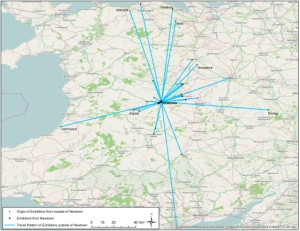 For some interesting insights into local food research here at Aber and in Wales more generally, please visit the Global-Rural research blog titled “Assembling Newtown” maintained by the WJ Edwards Research Center. The blog is part of an exciting five-year research project (Feb 2014 – Jan 2019) funded by the European Research Council. The project is internati
For some interesting insights into local food research here at Aber and in Wales more generally, please visit the Global-Rural research blog titled “Assembling Newtown” maintained by the WJ Edwards Research Center. The blog is part of an exciting five-year research project (Feb 2014 – Jan 2019) funded by the European Research Council. The project is internati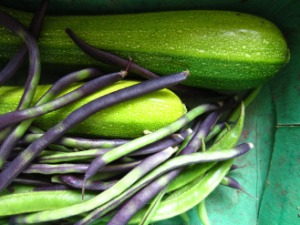 onal in scope and will draw on field
onal in scope and will draw on field
research in a range of different countries. The first part focuses on practices and experiences of everyday globalization in a rural small town through an in-depth study of Newtown in mid Wales. This episode highlights Newtown’s recently held food & drink festival and focuses on the globalisation of the industrialised food system and the place of ‘local’ food within that. You can find the blog here.
Agro-ecological revolution in Cuba
In case you missed last month’s talk by Dr. Julia Wright (Senior Research Fellow at the Centre for Agroecology, Water and Resilience (CAWR) at Coventry University) you can now watch the talk online and consult the accompanying Powerpoint presentation
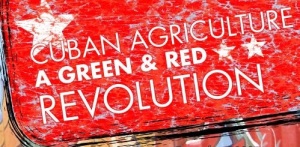 Julia presents research focusing on the socio-agricultural revolution that took place in Cuba after the fall of the Soviet Union. After the Cold War, Cuba lost access to the resources that supported its conventional agricultural system. In order to feed itself, the country had to transform its agricultural system as quickly as possible. The world is now facing many of the very same challenges, in that it cannot rely on a mode of agricultural production that uses large amounts of resources inefficiently. In order to counter environmental degradation other forms of fertilisation must be found without compromising production. What lessons can we learn from Cuba?
Julia presents research focusing on the socio-agricultural revolution that took place in Cuba after the fall of the Soviet Union. After the Cold War, Cuba lost access to the resources that supported its conventional agricultural system. In order to feed itself, the country had to transform its agricultural system as quickly as possible. The world is now facing many of the very same challenges, in that it cannot rely on a mode of agricultural production that uses large amounts of resources inefficiently. In order to counter environmental degradation other forms of fertilisation must be found without compromising production. What lessons can we learn from Cuba?
You can check out the contents of her book on food security in the post-oil era here or read a shorter article by Julia in the Huffington Post.

